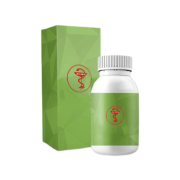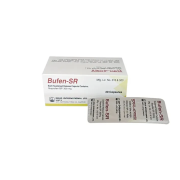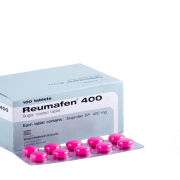Beflam Tablet
Ibuprofen
Indications
Beflam oral dosage form is indicated in Rheumatoid arthritis, Osteoarthritis, Gouty arthritis, Juvenile polyarthritis, Ankylosing spondylitis, Synovitis, Low back pain, Dysmenorrhoea, Fever, Migraine, Soft tissue injuries, Pain & Inflammation in dental and musculoskeletal origin.
Beflam topical gel contains Beflam and belongs to a group of medicines called non-steroid anti-inflammatory drugs (NSAIDs). These medicines reduce pain and inflammation and bring down a high temperature. Beflam 5% gel is used to treat a number of painful conditions affecting the joints and muscles, such as backache, rheumatic and muscular pain, sprains, strains and sports injuries. It is also used to treat pain from non-serious arthritic conditions and nerve pain (neuralgia).
Pharmacology
Ibuprofen has a high level of anti-inflammatory, anti-pyretic, and analgesic activity. The analgesic effects of Ibuprofen are due to both a peripheral and a central effect. Ibuprofen is a potent inhibitor of the enzyme cyclooxygenase, which thus results in a marked reduction in prostaglandin synthesis. Ibuprofen also inhibits the synthesis of some lipo-oxygenase products. Ibuprofen thus quickly relieves pain and stiffness, reduces swelling, and improves the movement of different joints of arthritis sufferers.
Dosage & Administration
Oral dosage form:
Adults: The dose is initially, 400 mg 3 times daily. A dose of 2400 mg daily should not be exceeded.
Children:
- 3-6 months (body-weight over 5 kg): ½ tsp (2.5 ml) 3 times daily; max. 30 mg/kg daily in 3-4 divided doses.
- 6 months-1 year: ½ tsp (2.5 ml) 3-4 times daily; max. 30 mg/kg daily in 3-4 divided doses.
- 1-4 years: 1 tsp (5 ml) 3 times daily; max. 30 mg/kg daily in 3-4 divided doses.
- 4-7 years: 1½ tsp (7.5 ml) 3 times daily; max. 30 mg/kg daily in 3-4 divided doses.
- 7-10 years: 2 tsp (10 ml) 3 times daily; upto 30 mg/kg (max. 2.4 gm) daily in 3-4 divided doses.
- 10-12 years: 3 tsp (15 ml) 3 times daily; upto 30 mg/kg (max. 2.4 gm) daily in 3-4 divided doses.
children weighing less than 5 kg: Not recommended for children weighing less than 5 kg.
In juvenile rheumatoid arthritis: up to 30-40 mg/kg of body weight daily in 3-4 divided doses may be taken or as directed by the physician.
Topical gel:
Adults: Squeeze 4 to 10cm (i.e. 1.6 to 4 inches) of gel from the tube on affected area. Massage until absorbed. This dose should not be repeated more frequently than every four hours and no more than four times a day in any 24 hour period. The amount of gel squeezed would be equivalent to 50 to 125 mg of ibuprofen. Ibuprofen 5% gel should only be used on healthy, unbroken skin. Do not use it on or near cuts or grazes or under dressings such as plasters. Also, do not use it on the genital area. Do not let any gel come in contact with your eyes. If it does, rinse your eyes with cold water and consult your doctor. Hands should be washed after applying Ibuprofen 5% gel, unless they are the site of treatment. If the condition does not improve after two weeks use, or becomes worse at any time, speak to your doctor or pharmacist.
Use in children: Ibuprofen 5% gel is not recommended for use in children under 12 years.
* চিকিৎসকের পরামর্শ মোতাবেক ঔষধ সেবন করুন‘
Contraindications
Ibuprofen is contraindicated in patients who have shown the previous hypersensitivity to Ibuprofen, and in patients with severe or active peptic ulceration.
Side Effects
Upset stomach, vomiting, heartburn, nausea may occur.
Pregnancy & Lactation
Adverse effects of Ibuprofen on the developing fetus cannot be fully excluded. Ibuprofen should not be used during pregnancy and for nursing mothers unless the potential benefits to the mothers outweigh the potential risks.
Precautions & Warnings
Beflam should be used with caution and the lowest effective doses should be given if there is a history of gastrointestinal hemorrhage or ulcer. Patients on long-term therapy with Beflam require ocular monitoring at regular intervals, as changes in ocular function have been reported. Patients with systemic lupus erythematosus are more likely than others to develop hypersensitivity to Beflam. Beflam should be prescribed with caution in patients with asthma and in patients with a history of hypersensitivity to other nonsteroidal anti-inflammatory agents.
Therapeutic Class
Drugs for Osteoarthritis, Drugs used for Rheumatoid Arthritis, Non-steroidal Anti-inflammatory Drugs (NSAIDs)
Storage Conditions
Keep all medicines out of reach of children. Store in a cool and dry place, protected from light.



